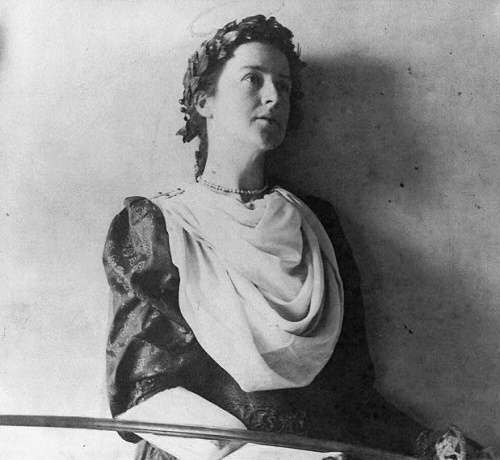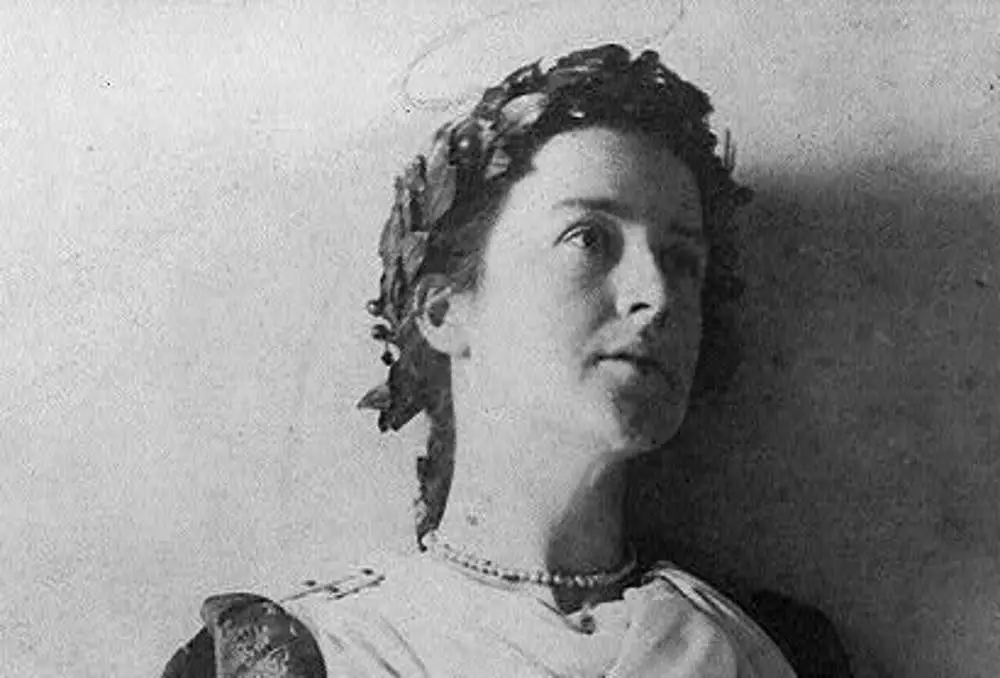When Irish-Catholic Louise Guiney got the job of postmistress in Auburndale, Mass., the town’s Protestants boycotted her stamps.
That created a problem. She needed money to support herself and her poetry, and a postmistress’s compensation depended on sales.
Fortunately, she had many, many friends in Boston’s artistic and intellectual circles who helped her get by.
Some view her as the ‘lost lady of American letters,’ but not because of her postal service job.

Louise Guiney by Fred Holland Day
Louise Guiney
She was born Jan. 7, 1861, in Roxbury, Mass., the daughter of Patrick Robert Guiney and Jeanette Margaret Doyle.
Her father emigrated from Ireland with very little money, but worked his way through college, became a lawyer and served heroically in the Civil War. He achieved the rank of brigadier general. After the war he entered politics, winning office as a Republican–one of the first Irish-Catholics to do so. He lost a bid for Congress but won as assistant district attorney. Plagued by his war injuries, he died when Louise was 16 and left little money.
A devout Catholic, she was educated at a convent in Providence, but couldn’t afford college. She continued to study on her own and to write poetry published in the Atlantic, Harper’s and Scribner’s.
Her biographer, Henry Fairbanks, called her a rare combination: ‘pure of heart, brilliant of mind.’ Critics considered her a bridge between Emily Dickinson and Edna St. Vincent Millay.
She also bridged the intellectual and artistic circles in fin-de-siecle Boston.
Bohemian
She formed a close friendship with a Bohemian group from a somewhat raffish Beacon Hill neighborhood that included the architect Ralph Adams Cram, Fred Holland Day, artist Tom Meteyard, poets Bliss Carman and Richard Hovey. Across the hill, she belonged to a group of intellectual women that included Celia Thaxter, Sarah Orne Jewett, Annie Fields and Alice Brown, with whom she is believed to have a Boston marriage.
Her financial straits forced her to take a job as postmistress in Auburndale. The postmistress’ compensation was determined by how much business the post office did. So Louise Guiney became victim of an anti-Catholic plot. Ralph Adams Cram, who organized a response, recollected,
The suburb of Auburndale was a favorite retreat of retired Protestant missionaries. …Suddenly the business began to decline rather alarmingly. Certain Sherlock Holmes procedures … revealed just what was happening… .. The situation was intolerable to the evangelical mind; therefore the Papist incumbent must be driven out by the simple expedient of transferring the trade to other neighbouring post offices – which was done.
Concerted action on the part of Lou Guiney’s friends produced notable results. We all bought postage stamps … in such quantities that the Auburndale post office advanced in the matter of business done, and with such leaps and bounds that finally an emissary from the Post Office Department was sent out to ascertain what it all meant.
Louise Guiney eventually took a job at the Boston Public Library, where she wrote poetry and essays in her spare time.

Boston Public Library
Oxford
In 1901, she moved to Oxford, England, where she used the libraries to research an anthology of Catholic poets. She also wrote several biographies and edited books about the Catholic literary tradition in England and Ireland. Though her health suffered, she stinted on food and coal to buy books.
Today, critics note her lyrical, Old English-style poems recall 17th-century English poetry. According to the Poetry Foundation.
Informed by her religious faith, Guiney’s works reflect her concern with the Catholic tradition in literature and often emphasize moral rectitude and heroic gallantry.
Louise Guiney died Nov. 2, 1920, of a stroke at age 59, leaving her work unfinished.
This story was updated in 2022.

